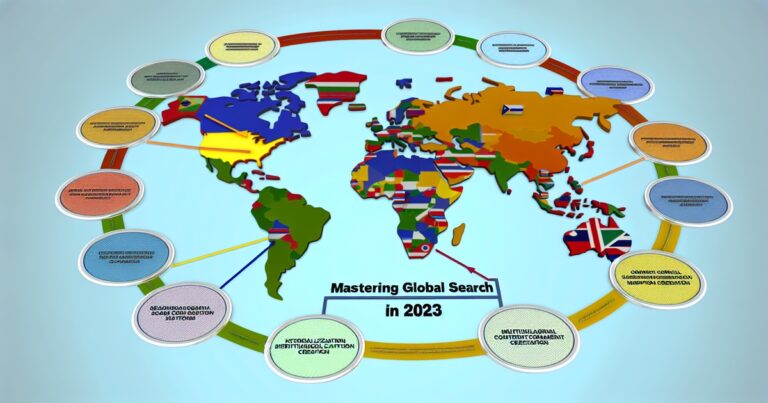The Importance of SEO for Ecommerce Sellers
In today’s digital age, having a strong online presence is crucial for businesses of any industry. For ecommerce sellers, the importance of visibility online cannot be overstated.
With the rise of online shopping and the ubiquity of search engines like Google and Bing, ecommerce sellers must ensure that their websites are optimized for online visibility if they want to succeed in this highly competitive marketplace. This is where Search Engine Optimization (SEO) comes in.
Effective SEO can help ecommerce sellers improve their website’s visibility on search engine results pages (SERPs), drive more traffic to their site, and ultimately increase sales. By optimizing their website’s content, structure, and technical aspects for search engines, ecommerce sellers can attract visitors who are actively looking for products like theirs.
The Goal of the Guide: To Help Serious Sellers Get Ranked Quickly
As an ecommerce seller, you know that time is money. The longer it takes your website to get ranked on search engines, the more opportunities you might be missing out on to drive traffic and sales. That’s why the goal of this guide is simple: to help serious sellers get ranked quickly.
Whether you’re just starting out with SEO or have been working on it for a while but aren’t seeing results yet, this guide will provide you with actionable tips and strategies that you can implement immediately to improve your rankings. From conducting keyword research to optimizing your site’s technical aspects, we’ll cover everything you need to know to start ranking higher on SERPs.
By following our recommendations and putting in the effort required for effective SEO implementation, we’re confident that you’ll see improvements in your website’s rankings – and ultimately see an uptick in traffic and sales as a result! So without further ado – let’s dive into our Ecommerce SEO Guide For Serious Sellers Who Want To Get Ranked Quickly.
Keyword Research
How to Conduct Keyword Research for Ecommerce Sites
Keyword research is the foundation of any successful SEO campaign. It helps you identify the most relevant and high-traffic keywords that your potential customers are using to find products or services in your niche. Here are a few steps to get started with keyword research:
1. Start with brainstorming: This involves listing words and phrases that are relevant to your business. Think about the products or services you offer and how your target audience would search for them.
2. Use Google Suggest: When you start typing a phrase into Google, it automatically suggests related terms. These can provide inspiration for additional keywords.
3. Analyze competitor websites: Look at the websites of your competitors and note the keywords they are targeting on their product pages, category pages, and blog posts. 4. Use keyword research tools: There are several tools available that can help you find relevant keywords, including Google AdWords Keyword Planner, Ahrefs, SEMrush, and Moz Keyword Explorer.
Tools and Techniques for Finding High-volume, Low-competition Keywords
Finding high-volume keywords isn’t always enough – you also want to target phrases that have low competition so that it’s easier to rank higher in search results. 1. Use long-tail keywords: Long-tail keywords include more specific search queries that people might use when looking for a specific product or service.
For example, “best organic dog food brand” instead of “dog food.” 2. Look at suggested bid prices: If advertisers are willing to pay higher amounts for certain keywords in PPC campaigns (Google Adwords), it’s an indicator of their value.
3. Analyze SERP features: Check if there features such as local packs or knowledge graphs on SERPs which could affect competition level against chosen results. 4.Use tools like Moz Explorer’s Keyword Difficulty tool which delivers estimated difficulty scores based on SERP analysis.
Importance of Long-tail Keywords
Long-tail keywords are very specific search queries that usually contain more than three words. They may have lower search volume than broader, one or two-word keywords, but they tend to be laser-targeted and convert better. Here are some benefits of targeting long-tail keywords:
1. Less competition: Because they’re more specific, long-tail keywords have less competition, making it easier to rank for them. 2. Higher conversion rates: People who use long-tail keywords are often further along in the buying process and are more likely to convert into customers.
3. More qualified traffic: Long-tail keywords tend to attract more qualified traffic because they’re more specific to the user’s intent. 4. Better ROI: Because long-tail keywords tend to be cheaper and have less competition, they can provide a better return on investment (ROI) compared to broader terms with higher costs-per-click.
On-Page Optimization
Optimizing Product Pages
When optimizing product pages for ecommerce SEO, there are a few best practices to keep in mind. First, it’s important to include the target keyword in the product title, along with any relevant modifiers (e.g. “men’s running shoes” or “organic baby clothes”). Additionally, including detailed product descriptions that use the target keyword and related terms can help search engines understand what your page is about.
In addition to these tactics, using high-quality product images and videos can also improve your search rankings. Make sure to optimize these visual elements by including descriptive file names and alt text that includes the target keyword.
Optimizing Category Pages and Site Content
In addition to individual product pages, it’s also important to optimize category pages and other site content for ecommerce SEO. This means using descriptive page titles that include relevant keywords as well as headings (e.g. H1 tags) that clearly indicate what each section of your site is about.
Another important element of on-page optimization is meta tags. While meta keywords are no longer used by most search engines, it’s still important to include a compelling meta description that uses the target keyword and entices users to click through to your site.
When writing content for your site, focus on providing value for users while also incorporating target keywords and related terms where appropriate. This could mean creating informative blog posts or resource articles that speak directly to your audience’s needs.
Tips for Effective Product Descriptions
When crafting product descriptions for ecommerce sites, it’s important to strike a balance between being informative and keyword-rich without sacrificing readability or user experience. Here are some tips for writing effective product descriptions:
– Start with a clear headline that includes the target keyword – Use bullet points or short paragraphs
– Highlight key features and benefits of the product – Use descriptive language to paint a picture in the reader’s mind
– Incorporate customer reviews or testimonials when possible By following these best practices, you can optimize your ecommerce site’s on-page elements for maximum visibility in search engine results pages.
Technical SEO
Technical SEO is the foundation of any successful ecommerce SEO campaign. It involves optimizing your site for search engines to easily crawl and index it. In this section, we’ll cover best practices for ensuring your site is crawlable and indexable by search engines, as well as tips for improving your site speed, mobile-friendliness, and URL structure.
How to ensure your site is crawlable and indexable by search engines
The first step in technical SEO is to make sure that search engine crawlers can easily access and understand your website’s content. This can be accomplished through a variety of techniques such as creating an XML sitemap, using robots.txt files to block unwanted content, and utilizing canonical tags to eliminate duplicate content.
Another important aspect of crawlability and indexability is making sure that all of your pages are included in Google’s index. You can use the Google Search Console tool to check if there are any pages that are not being indexed by Google or if there are any errors on the site that may be preventing indexing.
Importance of site speed and mobile-friendliness
Site speed has become a crucial factor for both user experience (UX) and SEO. Slow sites tend to have higher bounce rates which negatively impact rankings in the search results.
You should aim for a load time under three seconds which can be achieved by compressing images, removing unnecessary plugins or widgets, optimizing code (for instance using minification), leveraging browser caching etc. Mobile-friendliness also plays a critical role in ecommerce SEO because many users shop on their mobile devices.
In 2018 Google implemented Mobile First Indexing which means they prioritise indexing mobile-friendly versions over desktop versions when ranking websites on their Search Engine Results Pages (SERPs). To ensure that your ecommerce site is mobile-friendly you should use responsive design templates/plugins/themes (or similar) that automatically adjust the layout of your website based on the screen size of the user.
Tips for optimizing your site’s URL structure
Having a clear URL structure is important for both users and search engines to understand the content on your site. URLs should be descriptive, concise and include relevant keywords. For instance, rather than using generic product ID numbers, you can incorporate the product name in your URLs.
Additionally, try to keep URLs short as long URLs are less user-friendly and harder to share across social media platforms. In addition to using descriptive URLs, it’s important to minimize broken links and redirects when building out a website.
Broken links (404 errors) negatively impact UX while 301 redirects slow down page load times which further impacts SEO. By managing these technical SEO issues from an early stage you are setting up a strong foundation for future growth in organic traffic from search engines.
Link Building
Link building is an essential part of ecommerce SEO as it helps to increase the authority and relevance of your site in the eyes of search engines. The more high-quality backlinks you have pointing to your ecommerce site, the more likely it is that search engines will see your site as valuable and trustworthy.
However, it’s important to note that not all backlinks are created equal. It’s crucial to focus on building high-quality links from reputable websites in order to see the best results.
Strategies for Building High-Quality Backlinks
One effective strategy for building backlinks to your ecommerce site is through guest blogging on other relevant sites. By offering valuable content and including a link back to your site within your author bio or within the content itself (if allowed), you can increase the number of high-quality inbound links pointing to your site.
Another strategy is through influencer outreach, where you reach out to influencers in your industry and offer them free products or services in exchange for a review or mention on their blog or social media accounts. Social media marketing can also be a powerful tool for building backlinks.
By sharing valuable content from your ecommerce site on social media platforms such as Facebook, Twitter, and LinkedIn, you can increase visibility and encourage others to share or link back to your content. Additionally, participating in relevant online forums or communities can help build relationships with others in your industry and potentially lead to opportunities for link building.
The Importance of High-Quality Backlinks
When it comes to link building for ecommerce SEO, quality is always more important than quantity. In fact, having too many low-quality links pointing back to your site can actually harm rather than help your rankings.
Search engines are constantly evolving their algorithms with a focus on ensuring that the most relevant and reliable content appears at the top of search results. As such, they take into account the quality and relevance of inbound links in their ranking calculations.
In order to build high-quality backlinks, it’s important to focus on building relationships with other reputable websites and influencers in your industry. This can take time and effort but will ultimately pay off in the form of improved rankings and increased visibility for your ecommerce site.
Content Marketing
Content marketing is a highly effective strategy for boosting your ecommerce SEO efforts. By producing high-quality, informative content that targets relevant keywords, you can improve your site’s visibility and attract more organic traffic. In this section, we’ll explore how to use content marketing effectively for ecommerce SEO.
How to Use Content Marketing to Boost Your Ecommerce SEO Efforts
To use content marketing effectively for ecommerce SEO, it’s important to create content that provides value to your customers while also targeting relevant keywords. This can take many forms, such as blog posts, videos, infographics, and more. The key is to produce content that is both informative and engaging.
One effective approach is to create a blog or resource center on your site that provides valuable information about your products or industry. This can help establish you as an authority in your niche and provide valuable resources for customers who are researching products or making purchasing decisions.
Creating a Blog or Resource Center That Provides Value to Customers While Also Targeting Relevant Keywords
To create a blog or resource center that provides value to customers while also targeting relevant keywords, it’s important to conduct keyword research and identify topics that are both relevant and in-demand. You can then use these keywords as the basis for your blog posts or resource articles. When creating content, it’s important to focus on quality over quantity.
Each piece of content should be well-written and informative, providing real value to readers. You should also optimize each piece of content with meta tags and other on-page SEO techniques.
In addition to creating high-quality content on your own site, you can also leverage social media channels like Facebook and LinkedIn to reach a wider audience. By sharing links back to your blog posts or resource articles on these platforms, you can attract more traffic back to your site and improve your overall search engine rankings over time.
Local SEO (if applicable)
If your ecommerce site caters to a specific geographic area or has a physical storefront, optimizing for local SEO is an essential part of your digital marketing strategy. With local SEO, you can target potential customers who are searching for products or services in your area, and make sure that you show up in the search results when they’re ready to make a purchase.
One important aspect of local SEO is claiming and optimizing your Google My Business (GMB) listing. This allows you to appear in the map pack at the top of the search results page when someone searches for relevant keywords in your area.
Make sure that all of your business information is accurate and up-to-date, including contact information, hours of operation, and any special promotions or events. Another way to optimize for local search is to include location-specific keywords throughout your website content.
This can include mentions of nearby landmarks or neighborhoods, as well as using city names or zip codes in title tags and meta descriptions. You can also create location-specific landing pages that target specific cities or regions where you do business.
How local businesses can optimize their ecommerce sites for local search
In addition to claiming and optimizing your GMB listing and including location-specific keywords on your website, there are several other strategies that local businesses can use to improve their chances of ranking well in local search results. One important factor is building high-quality backlinks from other locally-relevant websites.
This includes directories such as Yelp or Yellowpages.com, as well as industry associations or chambers of commerce in your area. You can also reach out to other businesses in your community for guest blogging opportunities or link exchanges.
Another way to boost your local SEO efforts is by leveraging social media platforms such as Facebook and Instagram. By creating engaging content that targets potential customers in your area and interacting with other businesses and influencers on these platforms, you can increase your visibility and drive more traffic to your site.
Conclusion
Ecommerce SEO can be a complex and competitive field, but by following the tips and best practices outlined in this guide, serious sellers can improve their chances of ranking well in search results and driving more traffic to their sites. By conducting thorough keyword research, optimizing on-page content and technical SEO factors, building high-quality backlinks, creating valuable content for customers, and targeting local search opportunities when applicable, you can position your ecommerce site for success in the digital marketplace. Remember that SEO is an ongoing process that requires regular updates and adjustments based on changing trends and algorithms – but with persistence and dedication, you can achieve long-term success.









